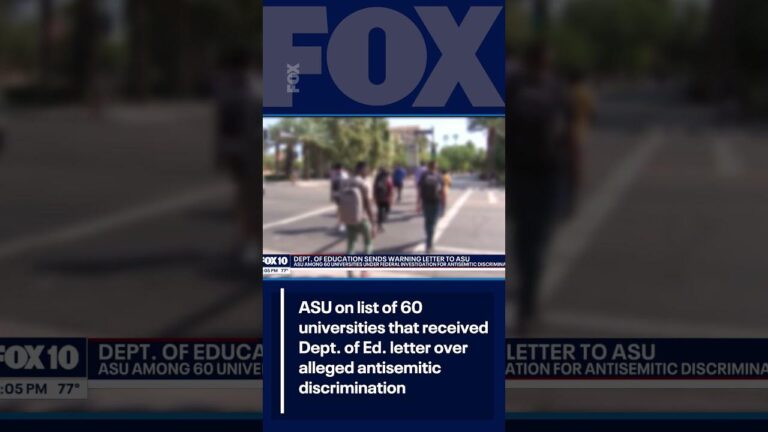Arizona State University is among 60 universities nationwide currently under federal investigation for allegations of antisemitic discrimination, according to a recent report by AZFamily. The probe, initiated by the U.S. Department of EducationŌĆÖs Office for Civil Rights, aims to examine whether these institutions have violated federal laws prohibiting discrimination based on religion. This development raises significant concerns about the campus climate and the treatment of Jewish students, prompting calls for increased accountability and transparent policies across higher education.
ASU Faces Federal Scrutiny Over Allegations of Antisemitic Discrimination
Arizona State University has recently come under federal investigation amid accusations of antisemitic discrimination, joining a list of 60 universities nationwide facing similar scrutiny. These investigations are spearheaded by the U.S. Department of EducationŌĆÖs Office for Civil Rights (OCR), following multiple complaints from students alleging systemic bias and discriminatory practices. The allegations encompass a range of concerns, from limitations on Jewish student organizations’ activities to alleged hostility in the campus climate that affects the Jewish community’s ability to participate fully in university life.
The inquiry highlights several areas of concern brought forward by students and advocacy groups, including:
- Claims of denial or restriction of funding to Jewish student groups
- Instances of antisemitic speech and behavior reportedly unaddressed by university officials
- Perceived unequal treatment in university disciplinary proceedings related to antisemitism
ASU, along with other institutions, is now tasked with cooperating fully with federal investigators to review policies and campus environments. The outcome of these investigations could lead to significant reforms aimed at fostering a safer and more inclusive atmosphere for all students.
Examining the Scope and Impact of the Federal Investigation on University Policies
The federal investigation into allegations of antisemitic discrimination at Arizona State University, alongside 59 other institutions, has prompted a comprehensive reassessment of campus policies nationwide. Universities are now under intense scrutiny to ensure compliance with federal civil rights laws and to cultivate inclusive environments free from religious discrimination. ASU and its peers are reviewing complaint procedures, bias reporting mechanisms, and educational programs aimed at combating antisemitism to reaffirm their commitment to protecting students’ rights and fostering diversity.
Institutions examined in this probe are expected to implement robust policy adjustments with key areas of focus including:
- Enhanced Training: Mandatory educational sessions for staff and students about religious harassment and discrimination.
- Transparent Reporting: Clear and accessible channels for reporting antisemitic incidents, with assurances of prompt investigation.
- Policy Revision: Updating non-discrimination policies to explicitly prohibit antisemitism and related hate-based conduct.
- Community Engagement: Collaborations with Jewish organizations to boost awareness and support affected students.
| Policy Area | Expected Changes | Potential Impact |
|---|---|---|
| Staff Training | Broader anti-discrimination modules | Improved awareness and response |
| Reporting Systems | 24/7 accessible digital platforms | Faster incident resolution |
| Policy Language | Explicit inclusion of antisemitism | Clearer guidelines and accountability |
| Student Engagement | Ongoing dialogue forums | Strengthened campus unity |
Voices from the Campus Community Respond to the Allegations
Students, faculty, and community members across the Arizona State University campus have shared a broad spectrum of reactions following the announcement of the federal investigation. While some express concern and urgency for a transparent review process, others emphasize the importance of protecting freedom of expression alongside combating discrimination. A sophomore student leader noted, “ItŌĆÖs crucial that our campus remains inclusive and safe for everyone, especially for Jewish students who have felt marginalized.”
- Faculty perspectives highlight the complexity of addressing antisemitism while maintaining academic freedom.
- Student groups have organized forums and discussions to raise awareness and promote dialogue.
- Administrative voices assure cooperation with federal authorities and reiterate commitment to equity.
| Community Voice | Response Summary |
|---|---|
| Jewish Student Union | Calls for immediate action and stronger safeguards |
| Faculty Senate | Focuses on policy clarity and educational programs |
| Non-Jewish Allies | Express solidarity and urge mutual understanding |
Recommendations for Universities to Address and Prevent Antisemitic Practices
Universities must take immediate and transparent actions to foster inclusive environments free from antisemitic discrimination. Implementing comprehensive training programs for faculty, staff, and students on recognizing and combating antisemitism is vital. These programs should include historical context, current manifestations, and practical strategies to create respectful discourse. Additionally, institutions should establish clearly defined policies that explicitly prohibit antisemitic behavior, backed by a transparent reporting system and swift disciplinary measures.
Collaboration and ongoing evaluation are key components in this effort. Universities should engage with Jewish student organizations and external advocacy groups to ensure policies and practices remain effective and culturally sensitive. Regular climate surveys and open forums can help identify problem areas early. The following table outlines core actions recommended for higher education institutions:
| Action | Description | Expected Outcome |
|---|---|---|
| Mandatory Training | Educational sessions on antisemitism and diversity | Increased awareness and prevention |
| Clear Reporting Channels | Anonymous and accessible complaint systems | Greater accountability and support |
| Policy Transparency | Published codes of conduct and enforcement procedures | Consistent and fair disciplinary actions |
| Community Engagement | Partnerships with Jewish groups and advocacy bodies | Stronger trust and cooperation |
Key Takeaways
As the investigation into allegations of antisemitic discrimination involving Arizona State University and 59 other institutions continues, the outcomes may prompt significant scrutiny and potential policy changes across campuses nationwide. ASU, alongside its counterparts, faces heightened expectations to address concerns of bias and ensure an inclusive environment for all students. The federal inquiry underscores the broader challenge universities face in combating discrimination and upholding civil rights. Further updates will follow as the Department of Education releases findings and universities respond to the evolving situation.









